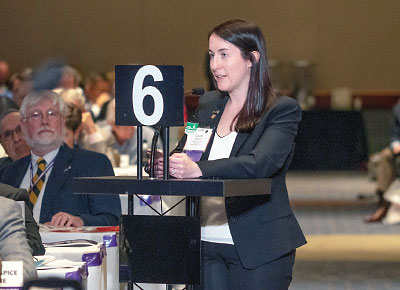Psychiatrist Appointed to Powerful AMA Ethics Council
Abstract
Rebecca Brendel, M.D., J.D., will serve on a council that occupies a special place within the AMA and all of medicine. Its opinions and policies are used around the world in ethical decision-making and public policy.
Psychiatrist and ethicist Rebecca Brendel, M.D., J.D., was appointed to the AMA’s important Council on Ethical and Judicial Affairs (CEJA) during last month’s meeting of the AMA House of Delegates in Chicago.
Brendel was appointed by incoming AMA President and psychiatrist Patrice Harris, M.D., M.A. Brendel is director of the master’s degree program at the Harvard Medical School Center for Bioethics and chair of the APA Committee on Ethics.

Psychiatrist and ethicist Rebecca Brendel, M.D., J.D., has spoken at APA and other meetings about confidentiality, patient autonomy, and the role of psychiatrists in assessing competency in patients requesting physician-assisted death.
(Also at the meeting last month, Laura Halpin, M.D., Ph.D., a child psychiatry fellow at the University of California, Los Angeles, was elected by the House to the AMA’s Council on Science and Public Health.)
CEJA occupies a special place within the AMA’s governance and in all of medicine; it is the body that maintains and updates the AMA’s 165-year-old Code of Medical Ethics. CEJA’s opinions and policies are used not only around the country but also the world in ethical decision-making, medical licensing board determinations, and public policy. APA’s code of ethics is modeled on the AMA code with “annotations especially applicable to psychiatry.”
At last month’s meeting, the House of Delegates approved a CEJA report on physician-assisted suicide. (Further coverage of the report and other business at the AMA meeting will be published in the next issue of Psychiatric News.)
Psychiatrist Jeremy Lazarus, M.D., who was appointed to the council last year and is a former AMA president, told Psychiatric News, “The council is one of the chief pillars of the AMA and has been since the organization was first formed in 1847. The development of an ethical code of conduct is one of the keys, along with education, to what makes medicine a self-regulating profession.”
The council is an independent body, not part of the AMA’s political process; its members are appointed by the AMA president and approved by the House of Delegates. CEJA members cannot be voting members of the House, but they can speak for the council on the House floor.
“As a delegate to this House, I have seen and experienced the ability of our great profession to overcome deep personal and political differences to advocate for the advancement of medicine, the well-being of our patients, and the promotion of public health more broadly,” Brendel said in an acceptance speech on the floor of the House of Delegates. “Our ethics are the backbone of our professional integrity, and, at this critical time of unprecedented advances and diversity in biomedicine and society, our AMA must navigate a course forward that is both faithful to the core values of medicine and inclusive of progress and possibility.

Psychiatrist Laura Halpin, M.D., Ph.D., will bring a research background in the neurobiology of addiction to her work on the Council on Science and Public Health.
“As a member of CEJA, I promise to bring a prepared and open mind, ready to advance the work of the council in providing thoughtful guidance to our AMA. I look forward to working with fellow CEJA members and AMA staff on important ethical issues before the field of medicine today toward an even better tomorrow.”
Psychiatrist James Sabin, M.D., outgoing chair of CEJA, is a longtime friend and colleague. “There couldn’t be a better appointment to CEJA than Becca Brendel,” he told Psychiatric News. “Becca has deep knowledge of clinical practice, ethics, and medical law. She has an excellent understanding of how organizations work, and an exceptional ability to move between ethical deliberation and practical action. She’s a great colleague and member of a team.
“While I’m sad that my own term on CEJA has ended, I’m honored and delighted to have Becca taking my place on the council,” Sabin said.
Halpin, elected by the House to the Council on Science and Public Health, has served as a delegate to the House of Delegates for nearly five years, first as a medical student and then as a resident. She is delegate to the resident and fellow section (RFS) from APA and serves as the vice speaker of the RFS Governing Council and as a sectional delegate from the RFS to the AMA House of Delegates. She is also an APA/APAF Leadership Fellow and serves as a member of the APA Council on Healthcare Systems and Financing. She is in her first year of a child psychiatry fellowship and plans to focus on substance use disorder research, placing her work directly at the intersection of policy, science, and public health. ■



